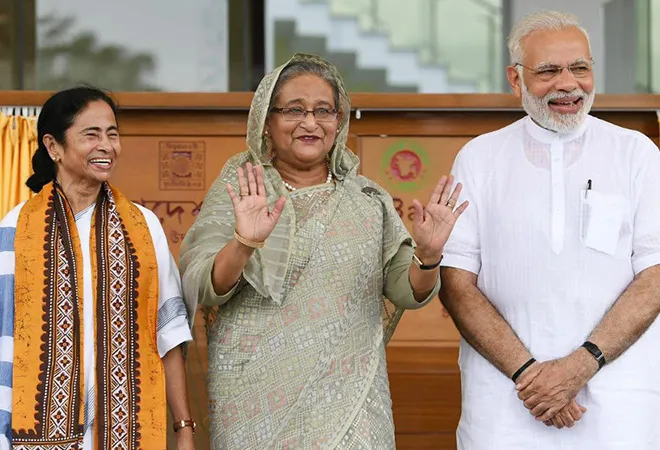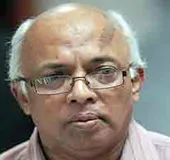
The election scene in Bangladesh has been taking some rather curious turns. The positive is the fact that the voting called for 30 December promises to be an inclusive one, given that all major as well as minor political parties have plunged into the campaign. The Bangladesh Nationalist Party, which for long informed the country that it would not participate in any elections with Sheikh Hasina continuing in office as prime minister; that it would join the campaign only if an interim administration was in place to supervise the elections; and that it would first have its leader Khaleda Zia freed from prison before going into the electoral exercise, has clearly eaten its words.
The inescapable reality today is that it is his (Dr. Kamal Hossain) personality around which the disparate opposition, particularly the BNP, has coalesced and mounted its current challenge to the government.
The BNP is now in full election mode, credit for which certainly goes to elderly politician Dr. Kamal Hossain. Dr. Hossain, who served in the government of Bangladesh’s founder Sheikh Mujibur Rahman as law and then foreign minister, was for a long time a leading figure in the Awami League until he fell out with Sheikh Hasina. At the age of 82, he obviously has had a political resurrection through providing leadership to the electoral movement against the Awami League government. The inescapable reality today is that it is his personality around which the disparate opposition, particularly the BNP, has coalesced and mounted its current challenge to the government.
But if that is a sign of politics taking a more participatory shape in the run-up to the elections, there are the disquieting features of the permutations and combinations, defining conditions at present. Dr. Hossain, whose trenchant criticism of the BNP in the past is a matter of record, has now adopted the sheaf of paddy — ‘dhaaner sheesh’ in Bengali and the election symbol of the BNP — as the overall symbol of the Jatiyo Oikyo Front or the National Unity Front he leads. Politics is thus rich in irony. Where once Dr. Hossain was a votary of the boat symbol of the Awami League, he is today on the other side of the table as the heat builds up before the elections. Always at the receiving end of condemnation from his former party, Hossain is now a happy, open target for the Awami League.
Dr. Hossain is not taking part in the elections, but some other loyalists of Sheikh Mujibur Rahman are. Professor Abu Sayeed, who served as a minister of state in Sheikh Hasina’s first government between 1996 and 2001, this year sought the ruling party nomination for this month’s polls. However, the nomination went to another candidate. And here comes the irony: piqued at being denied the party nomination, Sayeed went over to Dr. Hossain’s minuscule Gano Forum, a component of the National Unity Front, was given the nomination of the Forum and with that the sheaf of paddy symbol. It will be interesting to observe how Sayeed explains his new politics, given that for the past four decades he has consistently excoriated the BNP over the party’s misrepresentation of Bangladesh’s history. Another former Awami League stalwart and reputed freedom fighter, Kader Siddiqui, has also linked up with the National Unity Front, adopted the sheaf of paddy and has begun his campaign for the general election.
It will be interesting to observe how Professor Abu Sayeed explains his new politics, given that for the past four decades he has consistently excoriated the BNP over the party’s misrepresentation of Bangladesh’s history.
If Dr. Hossain, Sayeed and Siddiqui have turned their backs on the boat and gone for the sheaf of paddy, AQM Badruddoza Chowdhury, the founder secretary general of the BNP under the late military ruler Ziaur Rahman and a former president of Bangladesh, has surprised people by identifying himself with the politics, though not the party, of Prime Minister Sheikh Hasina. He has even gone on record with his suggestion that Bangladesh is in need of Sheikh Hasina’s continuation in power. Since his departure from the BNP in 2002, Chowdhury has headed his small party he calls ‘Bikalpadhara’ or Alternative Stream.
Excitement around the elections is intense, but that in no way ignores the issues which have been rearing their heads in these past couple of weeks. All the parties and alliances have had their nominees named, but what is worrying for the opposition is that it does not have a level playing field in sight. A number of BNP men have had cases slapped on them, thereby removing them from the field. Senior leaders of the party, who had planned to submit nominations for the incarcerated Khaleda Zia, were stopped in their tracks when the High Court made it clear that no person who has been convicted for two years plus could be a candidate for the elections.
All the parties and alliances have had their nominees named, but what is worrying for the opposition is that it does not have a level playing field in sight.
In all this election fever, former military ruler and Jatiyo Party leader Hussein Muhammad Ershad is once again the butt of jokes. Prior to the elections of January 2014, he was compelled to take admission in a hospital because the government did not want him to be a spoiler. That role appears to be repeated this year. Ershad is once again in hospital, the suspicion being that he will not reappear in public until his party, effectively led by his wife Roushan, reaches a deal with the ruling Awami League, as was done five years ago.
The elections will be fiercely contested. That seems understandable. The difference, though, between the past and present is that an unmistakable blurring of ideologies has come into national politics in these present times. Idealism has gone missing. With thousands of individuals seeking nominations from the major parties — and they include film actors, theatre activists, musicians, retired military and civil officers — it has been a colourful and amusing spectacle in these past couple of weeks.
The graph of voter curiosity around the elections goes on registering a day-to-day rise.
The views expressed above belong to the author(s). ORF research and analyses now available on Telegram! Click here to access our curated content — blogs, longforms and interviews.




 PREV
PREV


